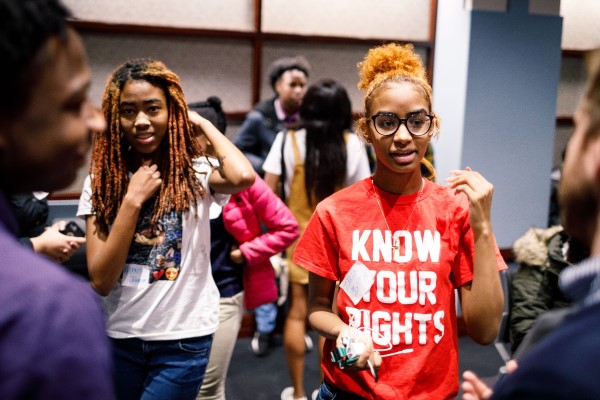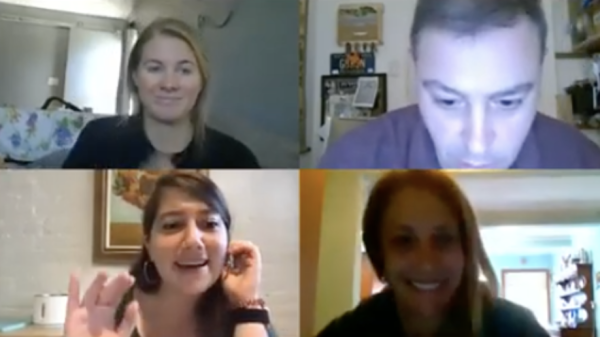Written by Justine Hipsky, Program Director of Mikva Challenge DC
A bustling auditorium. Dozens of middle and high school students pouring in the front doors and following the signs down the escalators, some springing with excitement and some whispering to their friends and their teachers about how nervous they’re starting to feel. A lively registration table with pump-up music playing in the background and an assortment of colorful nametags out for the taking. The sound of 120 young people playing musical questions to start the day before launching into a spirited Rock Paper Scissors tournament, building community and shaking off any nerves. This is a typical start of Mikva Challenge DC’s annual Citywide Project Soapbox event, an electrifying in-person celebration of youth expertise.
Mikva DC’s work revolves around amplifying youth voice and creating meaningful opportunities for DC’s young people to “learn democracy by doing democracy” through Action Civics, with one of our cornerstone programs being Project Soapbox. Project Soapbox asks young people to, well, get up on their soapboxes! Answering the prompt of “What is the most pressing issue facing your community, and what should be done about it?”, over a thousand middle and high school students from all eight Wards of DC write and deliver a 2-3 minute-long soapbox speech in their classrooms during the fall semester – on topics ranging from housing costs to gun violence to the inequities of public education – with finalists from every classroom attending our annual Citywide event each December.
Throughout a typical fall, we host professional learning community dinners and curriculum trainings for our incredible partner teachers. We visit schools, run guest lessons to kick off the Project Soapbox unit, and coordinate over 75 adult allies to visit these classrooms as civic partners and guest judges.
Of course, now, as we look ahead to the start of a new school that seems anything but “typical,” we’ve been asking ourselves the same questions as so many others. How do we continue to support our teachers and students effectively in the lead up to Soapbox and beyond? And how do we meet this moment to not only adapt our existing model but to also innovate and improve?
A huge piece of this innovation has been to adapt our Issues to Action curriculum to accommodate both asynchronous and synchronous remote learning. Mikva’s Issues to Action curriculum guides students through six steps of community problem-solving:
- Identity and Community Analysis
- Project Soapbox: Issue Identification and Envisioning Change
- Research
- Power Analysis
- Strategizing and Taking Action
- Showcase and Reflection.
Not long after social distancing began, we collaborated as a national team to convert key lessons and activities to be student-facing. From media literacy to how to create a community asset map to how to identify a Project Soapbox issue, we’ve compiled an array of resources for this age of physically distanced education. After receiving teacher input, we are continuing to expand our digital activity offerings to cover the span of the Issues to Action curriculum and to create and share fun instructional videos, student-facing PowerPoints, as well as opportunities for students to attend virtual election events this fall.
We are thrilled to continue to provide as many digital resources to our teachers and students as possible to amplify youth voices remotely, but we also know that teaching and learning don’t happen in a bubble. Since we sadly can’t bring our teacher cohort together in person for training and fellowship in the coming months as we normally would, we hosted a highly interactive, three-day Action Civics Institute over Zoom in early August. During this institute, we modeled how to build community and develop empathy in virtual classroom spaces in preparation for Project Soapbox and held two immersive Project Soapbox sessions where teachers got to explore how to facilitate digitally, as well as write and deliver their very own powerful speeches! To close, we asked participating teachers to encapsulate their professional development experience in one word. Some of the responses included:
“Ready!”
“Inspired!”
“Invigorated!”
To build on this momentum and further foster our professional learning community as we move from summer to fall, we have planned out a series of virtual teacher “dinners,” where programming will allow for community-building, best practice-sharing, and a chance to connect with Mikva DC staff.
As we move from summer into an unchartered new school year, we will be continuing to partner with our teachers to find out just what Mikva DC’s 2020 Project Soapbox will look like, sound like, and feel like. However, what we are certain of is that there is no stopping youth voices, and that DC’s young people need a microphone and a platform now more than ever. Project Soapbox speeches will still be delivered by middle and high school students from all eight Wards of the District, and we will be showcasing the finalists through an online platform.
We look forward to continuing to connect young people from across the city, as well as bringing youth voices directly to adult community members and elected officials. We may not have an auditorium this year, but we have this city’s leading community experts and they deserve to be heard.
If you are interested in learning more or serving as a Project Soapbox adult ally to support and celebrate DC youth voice this fall through our Project Soapbox program, please email Mikva Challenge DC’s Issues to Action Program Director, Justine Hipsky, at justine@mikvachallenge.org.



